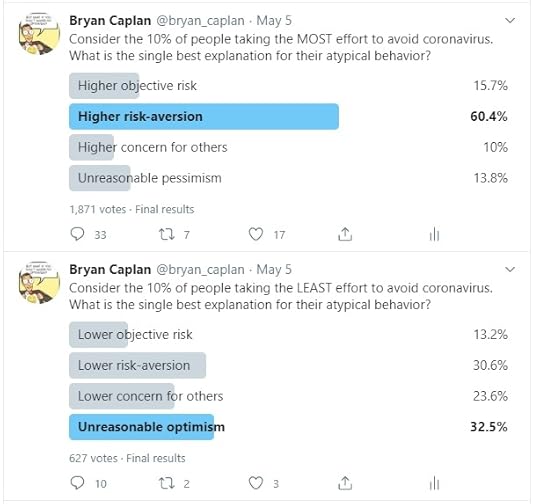Bryan Caplan's Blog, page 31
May 28, 2020
Too Terrified to Talk About It
I recently compared the fear of contracting coronavirus to the fear of sexual harassment accusations:
Am I really comparing the risk of contracting coronavirus with the risk of being accused of sexual harassment? Verily, because the parallels are loud and strong.
In both cases, people use social distancing for risk reduction. In both cases, the risk of most specific interactions is low. At the same time, however, people encounter an endless succession of risky situations – and the bad outcome...
May 27, 2020
The Roots of Caution
Last month, I ran this pair of Twitter polls. I was quite surprised by the asymmetric responses.

Few participants think that objective risk is the leading cause of caution. This makes sense to me; high profile cases aside, I don’t see the elderly being especially cautious, or the young being especially reckless. (Though admittedly, it’s pretty hard to see anyone these days). But when they want to explain low caution, they’re pretty evenly divided between the other explanations. When they w...
May 26, 2020
Social Anxiety, #MeToo, and Disaster
The last two months, I’ve spent many extra hours walking and biking. Encountering other people outdoors – and watching all parties avoid each other like lepers – is an eerie experience. Few human societies have ever made severe social anxiety so blatant. Viewing strangers with fear is the new normal.
How would you react, though, if someone got angry at you for avoiding them? The conversation might go like this:
Angry: Why on Earth are you avoiding me?
Anxious: I’m scared of getting sick.
An...
May 25, 2020
How Lockdowns Matter
How much do lockdowns really matter? Researchers recently noticed that behavior drastically changed before regulations did. Malone and Bourassa offer a provocative comparison in 538:
This sort of mass behavioral change in such a short time is significant. It took over 50 years and hundreds of billions of dollars in prevention efforts to lower the percentage of people who smoke in the U.S. from 42 percent in 1965 to 13 percent in 2018. Americans reacted to the threat of COVID-19 in a relative b...
May 21, 2020
Mitigation Multiplies
I hesitate to join the ranks of the abundant newly-minted amateur epidemiologists out there. But here goes.
I’ve heard many people claim that a population can’t reach herd immunity to any disease until 60-70% of the population has been infected. This is a grave overgeneralization; as this primer explains, the critical value for herd immunity directly depends on how contagious the disease is:
The critical value, or threshold, in a given population, is the point where the disease reaches an end...
May 20, 2020
Win-Win Denial: The Empirical Psychology
Contrary to what you’ve often heard, psychology is a great discipline that bristles with insight. Case-in-point: Johnson, Zhang, and Keil’s new working paper, “Win-Win Denial: The Psychological Underpinnings of Zero-Sum Thinking.” Quick version:
A core proposition in economics is that voluntary exchanges benefit both parties. We show that people often deny the mutually beneficial nature of exchange, instead espousing the belief that one or both parties fail to benefit from the exchange. Across...
May 19, 2020
Krikorian’s Craziest Belief
During our Soho Forum debate, Mark Krikorian claimed that the Democratic Party and the “corporate” wing of the Republican Party were the “Mensheviks to my Bolsheviks.” While I forthrightly advocate immediate open borders, both Democrats and Republicans are furtively and gradually working for the same goal. Though near-zero mainstream politicians ever say “I favor open borders,” that’s what they ultimately want. When I characterized this as a “conspiracy theory,” Mark denied the existence of an...
May 18, 2020
Sweden’s Keyhole Solution
As I explain in Open Borders, a responsible advocate of government intervention always asks, Is there any cheaper and more humane approach? Government should do something is perfectly consistent with Scrupulously avoid collateral damage. Following Tim Harford, I call such responsible approaches keyhole solutions. This recent AIER piece from James Cooper (via Dan Klein) provides a fine example:
I am an American living in Stockholm. I have been living here for 17 years and am fluent in...
May 14, 2020
Krikorian-Caplan Debate Results: A Little Analysis
Last weeks debate had before-and-after voting. Here are the results for the resolution, The current pandemic makes it all the more necessary for the federal government to tighten restrictions on immigration.
 Though I won, my general view is that the standard debate voting mechanism is deeply flawed.
Though I won, my general view is that the standard debate voting mechanism is deeply flawed.
Notice: If you defend a position no one initially agrees with, you cannot lose. So as Robin Hanson explains, one of the strongest predictors of victory is simply defending an initially unpopular...
May 13, 2020
Reflections on the Krikorian-Caplan Soho Forum Debate
Thanks again to Gene Epstein and Reason for sponsoring last weeks immigration debate between myself and Mark Krikorian. Thanks to Mark, too, for debating before an unsympathetic audience. The resolution, you may recall, was: The current pandemic makes it all the more necessary for the federal government to tighten restrictions on immigration.
Here are my extra thoughts on the exchange.
1. I was stunned that Mark did not think we should limit immigration to help fight contagious disease. ...
Bryan Caplan's Blog
- Bryan Caplan's profile
- 374 followers



